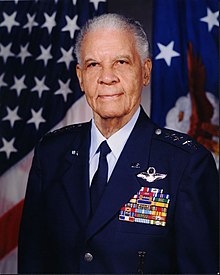| Samuel Doe 21st President of Liberia |
Today's Highlight in History 1985 – Major General Samuel K. Doe is announced the winner of the first multi-party election in Liberia
Samuel Kanyon Doe (May 6, 1951 – September 9, 1990) was the leader of Liberia from 1980 to 1990. He served as chairman of the People's Redemption Council and de facto head of state from 1980 until his election as the 21st President of Liberia in 1985. He was the first indigenous head of state in Liberian history.
Doe was a member of the rural Krahn tribe from inland Liberia. The Krahn people are a minority ethnic group but, like the majority of Liberians, they are of indigenous descent. Liberians of indigenous descent were historically faced with economic and political marginalization by the Americo-Liberian elites, who were descended from the free-born and formerly enslaved blacks from America who founded Liberia in 1847.
Under Doe, Liberian ports were opened to Canadian, Chinese and European ships, which brought in considerable foreign investment from foreign shipping firms and earned Liberia a reputation as a tax haven.
Doe attempted to legitimize his regime with a new constitution in 1984 and elections in 1985. However, opposition to his rule only increased, especially after the 1985 elections which were declared to be fraudulent by foreign observers, except the US which supported the Doe regime. In the late 1980s, as fiscal austerity took hold in the United States and the threat of Communism declined with the waning of the Cold War, the U.S. became disenchanted with entrenched corruption in Doe's government and began cutting off critical foreign aid to Doe. This, combined with the popular anger generated by Doe's favoritism toward his native Krahn tribe, placed him in a very precarious position.
| Doe with then Secretary of Defense of the United States Caspar W. Weinberger outside the Pentagon in 1982 |
After the coup, Doe assumed the rank of general and established a People's Redemption Council (PRC) composed of himself and 14 other low-ranking officers to rule the country. The early days of the regime were marked by mass executions of members of Tolbert's deposed government. One of Doe's first acts after seizing power was to order the release of about 50 leaders of the opposition Progressive People's Party who had been jailed by Tolbert during the rice riots of the previous month. Shortly after that, Doe ordered the arrest of 91 officials of the Tolbert regime. Within days, 11 former members of Tolbert's cabinet, including his brother Frank, were brought to trial to answer charges of "high treason, rampant corruption and gross violation of human rights. Suspension of the Constitution allowed these trials to be conducted by a Commission appointed by the state's new military leadership, with defendants being refused both legal representation and trial by jury.
wikipedia
World Events
1390 – First trial for witchcraft in Paris leading to the death of three people.
1618 – English adventurer, writer, and courtier Sir Walter Raleigh is beheaded for allegedly conspiring against James I of England.
1787 – Mozart's opera Don Giovanni receives its first performance in Prague.
1863 – Eighteen countries meet in Geneva and agree to form the International Red Cross.
1901 – Capital punishment: Leon Czolgosz, the assassin of U.S. President William McKinley, is executed by electrocution.
1923 – Turkey becomes a republic following the dissolution of the Ottoman Empire.
1945 – Getúlio Vargas, president of Brazil, resigns.
1948 – Safsaf massacre.
1953 – BCPA Flight 304 DC-6 crashes near San Francisco. Pianist William Kapell is among the 19 killed.
1957 – Israel's prime minister David Ben-Gurion and five of his ministers are injured when a hand grenade is tossed into Israel's parliament, the Knesset.
1960 – In Louisville, Kentucky, Cassius Clay (who later takes the name Muhammad Ali) wins his first professional fight.
1960 – An airplane carrying the Cal Poly football team crashes on takeoff in Toledo, Ohio.
1961 – Syria exits from the United Arab Republic.
1964 – The United Republic of Tanganyika and Zanzibar is renamed the United Republic of Tanzania.
1969 – The first-ever computer-to-computer link is established on ARPANET, the precursor to the Internet.
1985 – Major General Samuel K. Doe is announced the winner of the first multi-party election in Liberia.
1986 – British Prime Minister Margaret Thatcher opens the last stretch of the M25 motorway.
1994 – Francisco Martin Duran fires over two dozen shots at the White House (Duran is later convicted of trying to kill US President Bill Clinton).
1998 – Apartheid: In South Africa, the Truth and Reconciliation Commission presents its report, which condemns both sides for committing atrocities.
1998 – Space Shuttle Discovery blasts off on STS-95 with 77-year old John Glenn on board, making him the oldest person to go into space.
The Arabic-language news network Al Jazeera broadcasts an excerpt from a 2004 Osama bin Laden video in which the terrorist leader first admits direct responsibility for the September 11, 2001 attacks and references the 2004 U.S. presidential election.
2005 – Bombings in Delhi kill more than 60.
2008 – Delta Air Lines merges with Northwest Airlines, creating the world's largest airline and reducing the number of US legacy carriers to five.
2012 – Hurricane Sandy hits the east coast of the United States, killing 148 directly and 138 indirectly, while leaving nearly $70 billion in damages and causing major power outages.
2013 – Turkey opens a sea tunnel connecting Europe and Asia across the Bosphorus Strait in Istanbul.






